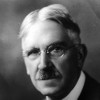“ If the living, experiencing being is an intimate participant in the activities of the world to which it belongs, then knowledge is a mode of participation, valuable in the degree in which it is effective. It cannot be the idle view of an unconcerned spectator. ”
John Dewey, Democracy and Education (1916). copy citation
| Author | John Dewey |
|---|---|
| Source | Democracy and Education |
| Topic | experience activity |
| Date | 1916 |
| Language | English |
| Reference | |
| Note | |
| Weblink | http://www.gutenberg.org/files/852/852-h/852-h.htm |
Context
“For the doctrine of organic development means that the living creature is a part of the world, sharing its vicissitudes and fortunes, and making itself secure in its precarious dependence only as it intellectually identifies itself with the things about it, and, forecasting the future consequences of what is going on, shapes its own activities accordingly. If the living, experiencing being is an intimate participant in the activities of the world to which it belongs, then knowledge is a mode of participation, valuable in the degree in which it is effective. It cannot be the idle view of an unconcerned spectator.
(iii) The development of the experimental method as the method of getting knowledge and of making sure it is knowledge, and not mere opinion—the method of both discovery and proof—is the remaining great force in bringing about a transformation in the theory of knowledge.”
source


